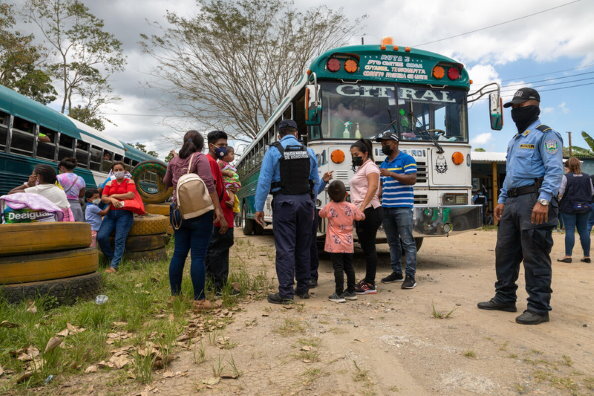Building resilient communities top priority as WFP chief visits Central America

“When you don’t have food to feed your children, when you don’t have money to buy medicines you are pushed into desperation”, said Beasley. “People don’t want to leave their homes, they are being forced to.”
Hunger in Central America has quadrupled over the past two years, with 8 million people now hungry. Of this figure, 1.7 million people are in the ‘Emergency’ category of food insecurity meaning they require urgent food assistance.
The rise in hunger has coincided with a doubling in the number of people planning to migrate. A WFP assessment conducted in January 2021 saw at least 15 percent of people surveyed wanting to migrate as compared to only eight percent in 2018.
“You are hearing about all the migration. People have lost their jobs. They have lost their hope. We urgently need to help people with food as well as long-term development that requires more than a piecemeal approach,” said Beasley.
It costs the US close to US$4000 per person, per week to support migrant teenagers and children at the border[1] while it costs WFP between US$1 and US$2 per person, per week to support people in Central America through our resilience projects.
“Sustainable livelihoods, strengthened resilience and self-reliant communities are WFP’s priorities in Central America. We want people to have hope in their future, faith in their lands and opportunities at home,” said Beasley.
WFP’s resilience building work was the focus of Beasley’s visit to Honduras and Guatemala. WFP provides technical and financial support to communities so they adapt their production to a changing climate and can generate more income. Farmers improve their methods, diversify their crops and also their livelihoods.
Multi-year programmes with smallholder farmers in Central America have helped communities harvest water, build irrigation systems, greenhouses and nurseries. Farmers aim to harvest a variety of crops year-round. Alternatives also include poultry farms, fisheries, honey, hammock production etc.
With food and cash, WFP is also reaching families affected by Hurricanes Eta and Iota that upended lives throughout Central America in November 2020, as well as thousands of vulnerable families dealing with job losses in urban and rural areas, a fallout of COVID-19.
Beasley’s mission also included a trip to Haiti where he saw WFP’s work with rural communities, rehabilitating salt basins and increasing productivity. He also saw WFP’s ongoing preparedness activities ahead of the upcoming hurricane season in June.
Link to broadcast quality footage here.
Link to hi-res photos here.
# # #
The United Nations World Food Programme is the 2020 Nobel Peace Prize Laureate. We are the world’s largest humanitarian organization, saving lives in emergencies and using food assistance to build a pathway to peace, stability and prosperity for people recovering from conflict, disasters and the impact of climate change.
Follow us on Twitter @wfp_media
[1]Biden administration spending $60 million per week to shelter unaccompanied minors - The Washington Post
Topics
Guatemala Refugees and migration Climate Executive DirectorContact
For more information please contact (email address: firstname.lastname@wfp.org):
Norha Restrepo, WFP/Panama, Mob. +507 6671 5355
Frances Kennedy, WFP/ Rome, Mob. +39 346 7600 806
Tomson Phiri, WFP/ Geneva, Mob. +41 79 842 8057
Jane Howard, WFP/ London, Mob. +44 (0)796 8008 474
Shaza Moghraby, WFP/New York, Mob. + 1 929 289 9867
Steve Taravella, WFP/ Washington, Mob. +1 202 770 5993
